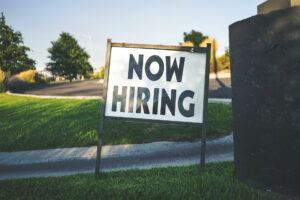COVID impacts on space talent and our tips for success
COVID-19 has altered the landscape for organisations globally and affected the workforce in a number of different ways. Lockdown restrictions have meant staff have been working from home; redundancies have ensued; candidates previously open to the opportunity of a new career have hunkered down in symmetry with many of their employing organisations and those that have made the leap to a new career have had to interview and onboard remotely.
Positively however, EVONA can report the future for the sector is far from grim.
Companies are hiring, new career opportunities are available and thanks to technological adoption, working, onboarding and interviewing remotely is not only successful, but is likely to become standard practice.
Job-seeking during COVID-19

The reported findings of Space Talent’s COVID assessment of May 2020 indicates there has been a 60% reduction in job seekers from Jan to date. At EVONA we’ve certainly seen a shift in candidate mindset with a general reluctance to leave a current position or pursue an opening in the market.
Our response to this has been a simple one:the number of redundancies in the sector will naturally create an influx of very high quality candidates into the market and increase the competition for roles. We urge those offered a position that meets requirements to make the move. Waiting is likely to delay career goals, restrict future movements and tie the candidate to their current role longer than anticipated.
Candidate tips for success
Take the job: As we’ve just mentioned, waiting to take a role or pursue a new position will only delay your career goals. After COVID-19 the competition for positions will increase. Accepting offered positions will enhance your career potential.
Prepare for interviews: Perhaps the largest change for the workforce has been the need to get to grips with remote interactions, and the most noticeable concern amongst the job seekers: the video interview.
Preparing for a video interview isn’t necessarily any different from meeting with the employer in person; in fact, it can work to your advantage. We encourage anyone to prepare for an interview thoroughly by researching the company and have notes on hand.
You should present yourself in the same way you would a personal interview, considering body language and dress. Test your systems before dialling in, but remain calm if the worst does happen; we’ve all had a bad tech day.
Utilise technology to work from home: Working for home and onboarding into a new organisation is absolutely possible, even during lockdown. At EVONA we have hired four people during the pandemic, all onboarding and becoming part of the team utilising video conferencing, instant messenger services and email.
You can read more on our top tools to streamline working from home in our article here.
Recruiting during COVID-19

It was certainly true in February that for some of the companies we work with, COVID-19 resulted in slower contracting and was expected to have a mixed impact on revenue targets. This uncertainty seemed somewhat reflected in Space Talent’s recent COVID assessment which reported~30% fall in available jobs from March – May (though the rate is slowing); and certainly in late February, we were seeing clients withdraw jobs feeling it ‘wasn’t the time to hire’.
Happily however, to us, this feeling seemed relatively short-lived and others companies we work with have been all too ready to continue with the recruiting effort. 80% of the business EVONA conducts is within the United States and the goal here is clear: American companies must remain the world leaders in space technology.
It is perhaps this mission that has meant despite the feelings of early spring, we find ourselves in a very different environment currently. We’ve just reported the best ever month in our trading history for May 2020, with a steady monthly increase from March.
Whilst we believe our specialist recruitment practices – frequently handling remote hiring situations coupled with the pace and quality of candidate placements – are certainly a factor in our recruitment success despite the pandemic, there is also indication that for some companies, it’s business as usual; and that extends to recruiting new assets into the company.
Space Talent’s report noted that 16.7% of businesses surveyed expected to slightly or moderately increase the headcount within their organisation.
Perhaps this is down to space companies experiencing elevated risk to their survival with funds tied to deliverables and completion of contracts. With the space workforce highly specalised, companies are under pressure to deliver on deadlines and strategically pulling back on the recruiting effort will hamper the delivery of those contracts. We’ve heard from our clients that customer confidence in their ability to deliver on projects is strongly tied to the quality of their workforce. Quality hires have directly resulted in the extension of contracts and the perceived ability of the organisation. With a 60% reduction in the number of job seekers, reaching candidates is a new challenge and quality and pace of hire is crucial.
It certainly feels to us that hiring in key areas of the industry hasn’t slowed at all, in fact, quite the opposite. If this quick turn around is at all indicative of the way in which the sector will bounce back we believe it will be business as usual soon.
Hiring company tips for success

Hire now: Despite initial trepidation, companies looking to hire to reach objectives prior to the outbreak haven’t stopped. It is our view that it will be these companies that will be able to pick up where they left off and make advances on the market whilst others halting recruitment may stagnate. Offering suitable candidates an offer in principle will secure the talent, enable time to familiarise them with organisational procedures and provide security for the candidate.
Utilise technology: Interviewing through video conferencing has never been more necessary. Adopting this method has always shown innovation; it reduces the necessity to travel, allows instant connections, frees up tight schedules of hiring managers, streamlines the recruiting effort, is cost effective and crucially, can currently keep us all safe at the moment whilst not hampering growth.
Embrace remote working: Flexible working conditions are not only generating a happier, more productive workforce, it’s a valuable incentive employers are using to attract new applicants. Many of the job seekers we speak to are searching for greater work-life balance and broader choices in terms of where and how they work. A recent study revealed that allowing employees the flexibility to work from home also increased loyalty. The space sector workforce is highly skilled and not easily reconstituted; it takes considerable time and effort to reconstruct the talent required to restore full operational capabilities. Considering remote-working will retain the skilled employees within an organisation.
The requirement to be able to work from home was on the rise before COVID-19; it’ll be even more popular now and employers need to tool up to be able to satisfy this requirement.
What will the future bring?
From what EVONA has reported, the future of the space sector is certainly secure – if that were ever in doubt. Two years ago the Bank of America predicted that the sector would be worth 2.7 trillion in 20 years time and there’s no reason to question that prediction now. After all, despite a global pandemic, we’ve just experienced the first crewed mission to the ISS from US soil for 11 years; a mission made possible by the increased commercialisation of the sector. Surely that’s as good an indication as any of the resilience of the space industry.
Sources:
- Space Talent COVID assessment 2020 (May 2020)
- Defence Innovation unit – Covid-19 impacts on the US commercial Industry (May 2020)
- IWG Global Workforce survey (March 2019)
- Owl Labs(2019)
- Flex Jobs Survey (2018)